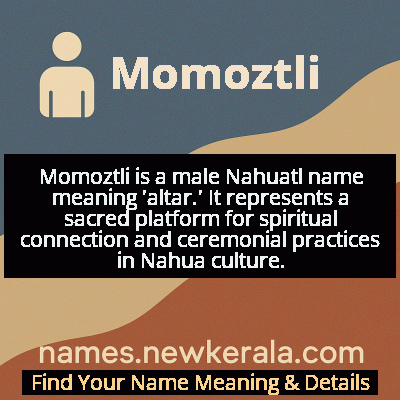Momoztli Name Meaning & Details
Origin, Popularity, Numerology Analysis & Name Meaning of Momoztli
Discover the origin, meaning, and cultural significance of the name MOMOZTLI. Delve into its historical roots and explore the lasting impact it has had on communities and traditions.
Name
Momoztli
Gender
Male
Origin
Nahuatl
Lucky Number
6
Meaning of the Name - Momoztli
Momoztli is a male Nahuatl name meaning 'altar.' It represents a sacred platform for spiritual connection and ceremonial practices in Nahua culture.
Momoztli - Complete Numerology Analysis
Your Numerology Number
Based on Pythagorean Numerology System
Ruling Planet
Venus
Positive Nature
Harmonious, responsible, caring, and artistic.
Negative Traits
Overly idealistic, superficial, possessive, or jealous.
Lucky Colours
Pink, turquoise.
Lucky Days
Friday.
Lucky Stones
Diamond, turquoise.
Harmony Numbers
2, 3, 9.
Best Suited Professions
Artists, musicians, teachers, healthcare workers.
What People Like About You
Warmth, nurturing nature, artistic flair.
Famous People Named Momoztli
Momoztli Xochitl
Aztec Priest
Chief priest of Huitzilopochtli temple who oversaw major religious ceremonies during Moctezuma I's reign
Momoztli Tecuhtli
Nahua Scholar
Documented pre-Columbian religious practices and helped preserve Nahuatl traditions during Spanish colonization
Momoztli Cipactli
Community Leader
Revitalized Nahuatl language and traditions in contemporary Mexican indigenous communities
Name Variations & International Equivalents
Click on blue names to explore their detailed meanings. Gray names with will be available soon.
Cultural & Historical Significance
In contemporary indigenous communities, the name has experienced a revival as part of cultural reclamation movements, symbolizing the preservation of ancestral knowledge and spiritual practices against centuries of colonization and cultural erosion. The choice of this name today represents a conscious effort to maintain linguistic continuity and honor the sophisticated spiritual understanding of pre-Columbian civilizations. It serves as a living connection to ancient wisdom while adapting to modern contexts, demonstrating the resilience of indigenous cultural practices and the ongoing relevance of Nahua cosmological concepts in understanding human spirituality and community building.
Extended Personality Analysis
Individuals named Momoztli are often perceived as having a grounded, stable presence with deep spiritual inclinations. They tend to be natural mediators who create safe spaces for others, embodying the altar's function as a meeting point between different realms. Their personality typically reflects strength, reliability, and a capacity for bringing people together in meaningful ways. These individuals often demonstrate exceptional emotional stability and are frequently sought out for wisdom and guidance. They possess a natural authority that isn't aggressive but rather emerges from their consistent, principled nature.
Like the physical altar they're named after, Momoztlis often serve as foundations within their families and communities - people others can depend on during difficult times. Their thoughtful approach to life and innate sense of ceremony makes them excellent at marking important life transitions and creating meaningful rituals for those around them. They tend to be deeply connected to tradition while also understanding the need for adaptation and growth. The name suggests someone who honors the past while building bridges to the future, much like how ancient altars served both timeless spiritual functions and adapted to changing cultural contexts throughout Mesoamerican history.
Modern Usage & Popularity
In contemporary usage, Momoztli remains a rare but meaningful choice primarily within Nahua communities and among families seeking to reconnect with their indigenous heritage. The name has seen a gradual increase in usage as part of the broader indigenous rights and cultural revitalization movements across Mexico and the Mexican diaspora. While still uncommon in mainstream contexts, it appears more frequently in academic circles studying Mesoamerican cultures and among activists working to preserve indigenous languages. Modern parents choosing this name often do so to honor ancestral traditions and instill a sense of cultural pride and spiritual connection in their children. The name's usage reflects a conscious decision to maintain linguistic and cultural continuity rather than following popular naming trends, positioning it as both a personal identifier and a political statement about cultural survival and identity reclamation.
Symbolic & Spiritual Meanings
Symbolically, Momoztli represents much more than just a physical altar - it embodies the concepts of foundation, sacred space, and spiritual connection. The name carries metaphors of stability and support, suggesting someone who provides emotional or spiritual grounding for others. It symbolizes the meeting point between earthly and divine realms, representing mediation, ceremony, and transformation. Like an altar that holds offerings and facilitates communication with higher powers, a person named Momoztli may be seen as a vessel for cultural memory and spiritual wisdom. The name also carries connotations of sacrifice and dedication, reflecting the ancient understanding that meaningful connections require commitment and offering of oneself. In a broader sense, it represents the human capacity to create sacred spaces wherever we are, transforming ordinary moments into meaningful ceremonies that connect us to something larger than ourselves.

